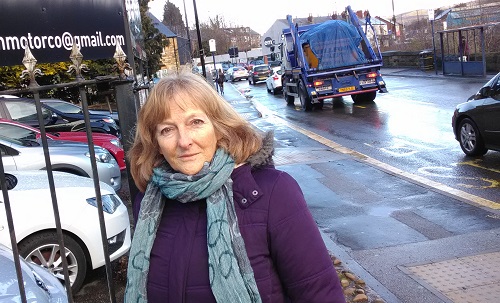
Sheffield Green Party has responded to the consultation on the Mottram by-pass, saying increased road capacity will increase congestion in Sheffield’s road hotspots
The consultation by Highways England, asked for views on road building to increase traffic capacity on the A57 Snake Pass route between Sheffield and Manchester. Sheffield Council, along with High Peak Borough Council and Tameside Council, has already declared a climate emergency.
Sheffield Greens are concerned that improving the attractiveness of the Snake Pass will mean more cars squeezing through Broomhill and Malin Bridge to reach the A57.
Cllr Douglas Johnson said,
“Heavy traffic through Mottram, on the Sheffield to Manchester route, has been a long-term issue. But rather than more road-building and private car mileage, we would prefer to see the money spent on better public transport links between the two cities. There must be an incentive for more people to travel by rail and not by private car.”
Christine Gilligan Kubo, Hillsborough Green Party commented:
“This council must prioritise public transport, walking and cycling; and stop nodding through damaging planning applications that bring many more car journeys to blight local communities. Coming soon to this area are a new Lidl at the bottom of Stannington Rd and a retail park with an Aldi opposite the Wednesday ground on Penistone Rd. All these direct more traffic through an already clogged and polluted Malin Bridge gyratory. Malin Bridge and Hillsborough Corner face gridlock and the trams are also delayed by this congestion which needs to be addressed urgently.”
Roy Morris, of Sheffield Green Party, said,
“I frequently shop in Broomhill and am very aware of the bad smell and the effect the poor air quality is having on our health. Therefore, I am strongly opposed to anything that would increase the volume of traffic through the neighbourhood. So, if this Mottram by-pass is going to get more people giving up on the train and going by car, and driving through Broomhill, then I’d be against it. as well as the train, there is the SnakeX57 bus they’ve just started, that comes through here empty. But more traffic through here? No thank you.”
ENDS
For more information please contact Douglas Johnson on 07981 860 662 or at douglas.johnson@sheffieldgreenparty.org.uk
NOTES TO EDITORS
Sheffield Green Party’s response to Highways England states:
I am writing to respond to the consultation. I am the leader of the Green Party group of councillors on Sheffield City Council. This response includes some expert views of our local members which we trust is helpful in explaining why we oppose this road expansion.
We believe that a reduction in road transport and radical moves towards a transport network, based to a much greater extent on public transport, are essential to meet the challenges of air pollution and climate change. Therefore, all new road expansion proposals need to be examined especially carefully at a time when travel habits and policy are rapidly changing.
Heavy traffic through Mottram, as a route from Sheffield to Manchester, has been a long-term issue. The link roads are designed partly to relieve this but would push the most serious congestion further east. Tintwistle and Glossop, particularly Dinting Vale, already have serious, almost continuous, day-time congestion which, to a large degree, is independent of the Mottram congestion. It is, however, worsened by the latter. Given that new roads attract greater volumes of traffic, we should assume those areas will suffer even more. It is naïve – negligent even – to assume otherwise. The tranquillity of the Peak District National Park in between them would also be clearly harmed.
Yet, there is a much more serious and wider issue that is not being addressed. This is to urgently reduce greenhouse gas emissions to address the climate emergency that Parliament and numerous local authorities across the country, including Sheffield City Council, have recognised.
In October 2019, High Peak Council also declared a Climate Emergency and “pledged to work towards a carbon neutral High Peak by 2030.” In November 2019, Derbyshire County Council pledged to become carbon neutral by 2032. In February 2020, Tameside Council declared a Climate Emergency and is now committed to become ‘carbon neutral’ by 2042 target with 13.1% year on year reductions in climate emissions.
The link road proposals should be assessed against these ambitions. Yet Highways England’s Preliminary Environmental Information Report (PEIR) Vol 1 dismissively states: –
“14.3.11 There is no accepted technical or policy guidance on how to determine the significance of a project’s effects on climate. “
However, the Government’s own official Climate Change Committee has repeatedly warned that current policies will not put the UK on a path towards meeting the legally binding Climate Change Act. Its recent recommendations for more rapid emissions reductions (by 68% rather than 61% by 2030) have been accepted. The Government clearly accepts the need for more rapid action but there still a wide gap between the targets and the policies designed to meet them.
We therefore believe it appropriate to compare the stated impacts of the scheme to The Tameside Council climate ambitions, which are supported by recent robust evidence. Some of the scheme would be in High Peak so, in practice, the impacts would be divided between the two Local Authority areas. [https://carbonbudget.manchester.ac.uk/reports/E08000008/ ]
This Tyndall Centre report shows that Tameside has a carbon budget of 4.57 MtCO2e for the period 2025-2032 [this figure is derived from Figure 1]. If the proportion of this for surface transport is 27%, as it is nationally [PEIR 14.4.1], this would be 1.23 MtCO2e.
The emissions attributable to the scheme over this period are given in Section 14.6 of the PEIR. If the construction emissions are accounted for evenly between 2025 and 2032 and in the transport sector, total emissions from the scheme up to the end of 2032 (the end of the national Fifth Carbon Budget period) would be 110757t. This represents 9% of Tameside’s notional transport carbon budget. For just two link roads, that is clearly a disproportionate share of the total emissions targets for an entire Local Authority area (or more accurately, a smaller share spread across two).
The various authorities in the area need to develop a coherent transport strategy which recognises how quickly greenhouse gas emissions need to be reduced. It would also bring air quality within legal limits. These new link roads cannot reasonably fit with any such plan. New road building will have to be minimised, in common with everywhere else in the UK.
Authorities and their partners in both Manchester and Sheffield are developing transport strategies that involve reductions in road traffic. These involve a much greater emphasis on providing facilities local to where people live, active travel and public transport. These plans would be hampered by increased road traffic between the two cities.
Public subsidy for this road-building scheme would tilt the attractiveness of the choice between road and rail travel between Sheffield and Manchester in favour of more private motors. This would inevitably worsen air pollution and climate change at all points along the route overall. It would also increase the knock-on effects of congestion in the Sheffield districts of Malin Bridge and Broomhill at the entrances to the A57 route.
We urge that this scheme be withdrawn because of the wider climate change issue and also because of the local impact on Sheffield residents.
Yours faithfully,


Comments
The Sheffield Green Party welcomes all comments but we will not be held responsible for any user comments. We do reserve the right not to publish comments that may cause offence.
One thought on “Green worries over more traffic in Malin Bridge and Broomhill”